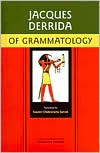Of Grammatology
Jacques Derrida's revolutionary theories about deconstruction, phenomenology, psychoanalysis, and structuralism, first voiced in the 1960s, forever changed the face of European and American criticism. The ideas in De la grammatologie sparked lively debates in intellectual circles that included students of literature, philosophy, and the humanities, inspiring these students to ask questions of their disciplines that had previously been considered improper. Thirty years later, the immense...
Search in google:
"One of the major works in the development of contemporary criticism and philosophy." — J. Hillis Miller, Yale UniversityJacques Derrida's revolutionary theories about deconstruction, phenomenology, psychoanalysis, and structuralism, first voiced in the 1960s, forever changed the face of European and American criticism. The ideas in De la grammatologie sparked lively debates in intellectual circles that included students of literature, philosophy, and the humanities, inspiring these students to ask questions of their disciplines that had previously been considered improper. Thirty years later, the immense influence of Derrida's work is still igniting controversy, thanks in part to Gayatri Spivak's translation, which captures the richness and complexity of the original. This corrected edition adds a new index of the critics and philosophers cited in the text and makes one of contemporary criticism's most indispensable works even more accessible and usable. Michael Wood The translation is a noble job, and we should be gratdful to have this distinguished book in our hands. -- New York Review of Books
AcknowledgmentsTranslator's PrefacePrefaceExergue31The End of the Book and the Beginning of Writing6The Program6The Signifier and Truth10The Written Being/The Being Written182Linguistics and Grammatology27The Outside and the Inside30The Outside Is [word is struck out] the Inside44The Hinge [La Brisure]653Of Grammatology as a Positive Science74Algebra: Arcanum and Transparence75Science and the Name of Man81The Rebus and the Complicity of Origins87Introduction to the "Age of Rousseau"971The Violence of the Letter: From Levi-Strauss to Rousseau101The Battle of Proper Names107Writing and Man's Exploitation by Man1182"... That Dangerous Supplement ..."141From/Of Blindness to the Supplement144The Chain of Supplements152The Exorbitant. Question of Method1573Genesis and Structure of the Essay on the Origin of Languages165IThe Place of the "Essay"165IIImitation195IIIArticulation2294From/Of the Supplement to the Source: The Theory of Writing269The Originary Metaphor270The History and System of Scripts280The Alphabet and Absolute Representation295The Theorem and the Theater302The Supplement of (at) the Origin313Notes317
\ New York Review of BooksThe translation is a noble job, and we should be grateful to have this distinguished book in our hands... [Spivak's] situating of Derrida among his precursors—Nietzsche, Freud, Heidegger, Husserl—and contemporaries—Lacan, Foucault, and the elusive animal known as structuralism—is very lucid and extremely useful.\ — Michael Wood\ \ \ \ \ \ Notes and QueriesThe tool-kit for anyone who wants to empty the 'presence' out of any text he has taken a dislike to. A handy arsenal of deconstructive tools are to be found in its pages, and the technique, once learnt, is as simple, and as destructive, as leaving a bomb in a brown paper bag outside (or inside) a pub.\ — Roger Poole\ \ \ \ New RepublicThere is cause for rejoicing in the translation of De la grammatologie... Just as Derrida discloses in Rousseau a writer who distrusts writing and longs for the proximity of the self to its voice, so Spivak approaches Derrida through the structure of his diction; no ideas but in the words themselves.\ — Denis Donoghue\ \ \ \ \ \ CantoReading Derrida was the shock of a decentering, the critical shift into a world of the interminable movement of difference, the crisis of any closure. Of Grammatology was and remains the most tightly worked... and exemplary... demonstration of the science of this shift and crisis.\ \ \ \ \ Michael WoodThe translation is a noble job, and we should be gratdful to have this distinguished book in our hands. -- New York Review of Books\ \








